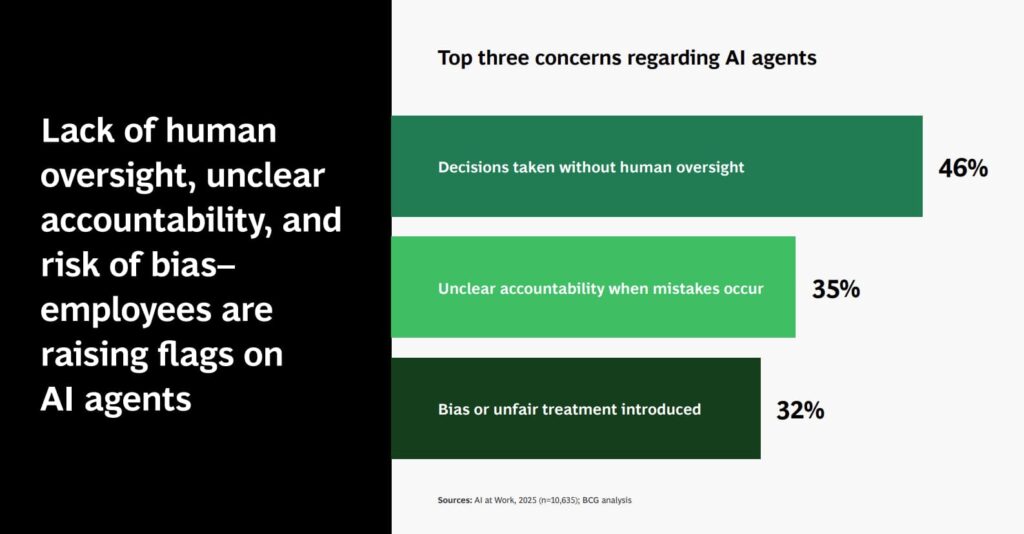As AI agents become more prevalent in the workplace, HR leaders play a critical role in shaping how these technologies are deployed. Yet despite their promise to transform operations, AI tools have seen limited integration into daily workflows.
According to a recent survey by Boston Consulting Group (BCG), only 13% of employees report that AI agents are deeply embedded in their routines, and just one-third understand their functionalities.
Experts such as Josh Bersin say AI agents are poised to reshape business processes by integrating siloed workflows and eliminating unnecessary steps across organizational boundaries.
However, research suggests that full deployment has stalled, with organizations moving briskly from experimentation to piloting AI agents but facing challenges in widespread implementation. The BCG survey underscores that while companies are making progress with AI, concerns about job security persist, especially as employees use AI more.

To successfully integrate AI and maximize its benefits, BCG advisors say companies should:
- Invest in training: Allocate appropriate resources and leadership support to ensure employees are well-prepared.
- Measure impact: Track improvements in productivity, quality and employee satisfaction to assess AI’s value.
- Reshape workflows: Prepare the workforce for AI’s impact through upskilling and reskilling initiatives.
- Experiment with AI agents: Conduct rigorous testing to accelerate learning and measure both benefits and risks.
HR tech in the news
Eightfold AI and Harvard Business Review released a report revealing a disconnect in AI strategy: HR teams are expected to lead AI-driven workforce transformation, yet only 5% of their workflows are AI-ready and most lack the tools to assess internal skills.
Skillsoft reported a 74% increase in AI learners and a 158% jump in AI learning hours year-over-year among its client base. As organizations pursue digital transformation, this surge signals growing momentum in closing tech skill gaps and expanding access to AI education at scale.
PSG Global Solutions launched Anna AI, a digital recruiter powered by proprietary technology and large language models. Designed to boost hiring efficiency, Anna AI helps staffing teams scale productivity and streamline recruitment processes across high-volume hiring environments.
Metaview, an AI recruitment startup, raised $35 million in Series B funding led by Google Ventures. The platform captures job interviews and converts them into structured, bias-free data, aiming to improve hiring quality and reduce subjective decision-making in recruitment processes.
goHappy has integrated goHappy AI into its app-free frontline engagement platform. The tool provides deskless workers with instant, personalized answers about PTO, benefits and company policies—without requiring them to download or navigate a traditional mobile app.
Guardian Payroll Services unveiled a cloud-based payroll platform combining technology with personalized service. The solution simplifies compliance and payroll processes while offering customized support to help businesses retain talent and enhance their overall HR operations.
Mind Reasoner, a new sentiment analysis tool for recruiting, detects subtle tone shifts and unspoken concerns during candidate interactions. It’s designed to reveal deeper insights into candidate mindsets and enhance hiring decisions beyond surface-level impressions.
AI-powered HR platform Wisq secured $15 million in new funding, bringing its total to $55 million. The company says the investment will help expand AI tools for HR teams and support its mission of fostering responsible, people-centered AI adoption in the workplace.
Remote launched a U.S.-based Professional Employer Organization (PEO), enabling companies to manage payroll, benefits and compliance nationwide. This expansion helps businesses scale operations across states without increasing internal HR burden.
Vimeo appointed Rose Frawley as chief people officer. Known for scaling teams and building high-performance cultures at YipitData and Vivix, Frawley’s hire reflects Vimeo’s continued investment in innovation, leadership and global talent strategy.
New usage data shows individuals increasingly turn to Anthropic’s Claude AI for emotional support, particularly during career transitions. Many also seek help with burnout, work/life balance and navigating difficult relationships in professional environments.
A Resume Builder survey of 1,300 U.S. managers found nearly 80% use AI to guide decisions on raises and promotions; over 20% let AI make final calls. Yet, most lack formal AI training, raising concerns about responsible AI use in management.
In January 2025, ComPsych upgraded its mental health platform with AI audio tools, multilingual content and other dynamic features. The organization released a fresh report indicating these enhancements produced a 38% rise in engagement, signaling growing interest in tech-driven employee support.
More from HR Executive
Kick off HR Tech 2025 with the exclusive, one-day HR Executive Strategy Summit. Designed for senior HR leaders, this invite-only event offers high-impact networking and strategic discussions. Space is limited for maximum impact. Let us know you’re interested when you register.
From predictive analytics to personalized learning, AI is rapidly transforming how skills are built—and who gets to build them. Yet even as the learning tech market balloons to nearly 600 vendors, according to RedThread Research, the influence of L&D in strategic discussions is fading. Learn more.
One in three employees says the pace of work over the past five years has become unsustainable. By 10 p.m., nearly 30% of active workers are back in their inboxes, showing how the workday now spills into what used to be personal time. See what the research says.



